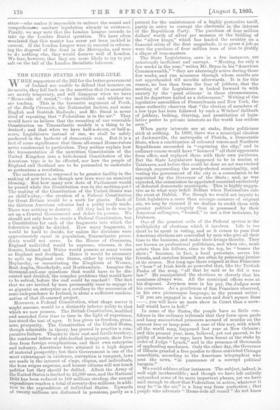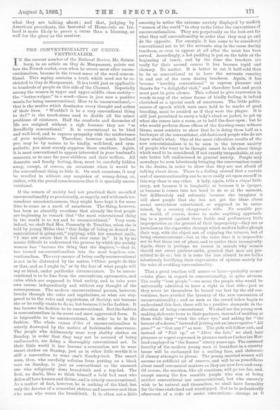THE UNITED STATES AND HOME-RULE.
WHEN supporters of the Bill for the better government of Ireland are unable to defend that measure on its merits, they fall back on the assertion that its anomalies are merely temporary, and will disappear when we have "Home-rule all round,"—the inevitable end whither we are tending. This is the favourite argument of Truth, of the Daily Chronicle, the Nationalist faction, and some English and Scottish Radicals ; and Mr. Stead is never tired of repeating that " Federalism is in the air." They would have us believe that the recasting of our venerable Constitution on Transatlantic models is a thing to be desired ; and that when we have half-a-dozen, or half-a- score, Legislatures instead of one, we shall be safely anchored in the harbour of democratic rest. But it is a fact of some significance that these all-round Home-rulers never condescend to particulars. They neither explain how the transmutation of the unwritten Constitution of the United Kingdom into a hide-bound Constitution of the American type is to be effected, nor how the people of England and Scotland are to be persuaded to undertake so portentous a revolution.
The rnducement is supposed to be greater facility in the making of new laws, as though new laws were an unmixed blessing. But how many new Acts of Parliament would be passed while the Constitution was in the melting-pot ? The making of the Constitution of the United States was no child's-play,—the creation of a Federal Constitution for Great Britain would be a work for giants. Each of the thirteen American colonies had a polity ready made. There was nothing to destroy. All they had to do was to set up a Central Government and define its powers. We should not only have to create a Federal Constitution, but a Constitution for each of the fragments into which the federation might be divided. How many fragments, it would be hard to decide, for unless the divisions were approximately equal in population, Transatlantic prece- dents would not serve. In the House of Commons, England undivided would be supreme, whereas, in the Senate, Ireland and Wales would possess as many voices as England and Scotland. Hence it would be necessary to split up England into States, either by reviving the Heptarchy, or resuscitating the Kingdoms of Wessex, East Anglia, Strathclyde, and Northumbria. Imagine the thousand-and-one questions that would have to be dis- cussed and decided, the complex problems that would have to be solved, before the end could be reached ! The fact that we are invited by men presumably sane to engage in so gigantic an enterprise as a corollary to the concession of semi-independence to Ireland, is alone a sufficient condem- nation of that ill-omened project.
Moreover, a Federal Constitution, what shape soever it might assume, would be a distinctly inferior polity to that which we now possess. The British Constitution, modified and amended from time to time in the light of experience, has stood the test of ages. It has given us freedom, great- ness, prosperity. The Constitution of the United States, though admirable in theory, has proved in practice a com- parative failure. Thanks to their vast and fertile territory, the continual inflow of able-bodied immigrants, their free- dom from foreign complications, and their own enterprise and industry, Americans have attained to a high degree of material prosperity; but their Government is one of the most extravagant in existence, corruption is rampant, laws are made in the interest of rings, cliques, and individuals, the boss reigns supreme, and honest citizens will not touch politics lest they should be defiled. Albeit the Army of the United States is limited to 25,000 men, and the National Debt has been reduced to 160 millions sterling, the annual expenditure reaches a total of seventy-five millions, in addi- tion to the expenditure of individual States. Upwards of twenty millions are disbursed in pensions, partly as a pretext for the maintenance of a highly protective tariff, partly in order to corrupt the electorate in the interest of the Republican Party. The purchase of four million dollars' worth of silver per mensem at the bidding of the " silver kings," which has landed the country on a financial crisis of the first magnitude, is as gross a job as were the purchase of four million tons of iron to gratify a clique of iron-masters. The State Legislatures, save in a few instances, are notoriously inefficient and corrupt. " Meeting for only a few weeks in the year," writes Mr. Bryce in his "American Commonwealth," " they are alarmingly active during those few weeks, and run measures through whose results are not apprehended till months afterwards. It is for this reason, no less than from the fear of jobbery, that the meeting of the Legislature is looked forward to with anxiety by the good citizens ' in these circumstances, and its departure hailed as a deliverance." Writing of the legislative assemblies of Pennsylvania and New York, the same authority observes that " the election of members of a low type has been followed by such a Witches' Sabbath of jobbery, bribing, thieving, and prostitution of legis- lative power to private interests as the world has seldom seen."
When party interests are at stake, State politicians stick at nothing. In 1889, there was a municipal election at Jacksonville, the metropolis of Florida, a Democratic State, when a combination of coloured voters and Northern Republicans succeeded in " capturing the city," and in ordinary course would have " bounced " all their opponents from office, and replaced them with their own partisans. But the State Legislature happened to be in session at Talahasee, and before this could be done an act was rushed through superseding the newly-elected municipality, and vesting the government of the city in a commission to be appointed by the Governor of the State ; and, ifs was expected, the commission he appointed consisted exclusively of defeated democratic municipals. This is highly sugges- tive as to what may befall Belfast when Nationalists rule the roost at Dublin. For though we would not impute to Irish legislators a more than average--measure of original sin, we may be excused if we decline to credit them with greater political integrity than is possessed by their American colleagues, " bossed," in not a few instances, by Irishmen.
One of the greatest evils of the Federal system is the multiplicity of elections which it involves. Life is too short to be spent in voting, and so it comes to pass that American elections are controlled by men who give all their time to the business, and make their livings thereby. They are known as professional politicians, and when one, more astute than his fellows, rises to the top, he " bosses the show ; " becomes, in fact, a local potentate, serves his friends, and enriches himself, too often by poisoning justice at its source. Not long ago there reigned at San Francisco a " boss " of Irish birth so powerful that, like the Turkish Pasha of the song, " all that he said or he did it was law." He manipulated the elections so cleverly that his nominees always won. All the municipal offices were at his disposal. Jurymen were in his pay, the Judges were his creatures. As a gentleman of San Francisco observed, in his own picturesque language, to the present writer : "If you are engaged in a law-suit and don't square Boss —, you will have no more show in Court than a snow- ball would have in hell."
In some of the States, the people have so little con- fidence in the ordinary tribunals that they force open gaols and hang unconvicted prisoners accused of murder on the nearest tree or lamp-post. A case of this sort, with which all the world rang, happened last year at New Orleans ; and this present year, men, believed, yet not proved, to be guilty of murder or rape, have been burnt at the stake by order of Judge "Lynch," and in the presence of thousands of applauding spectators. Only the other day, the Governor of Illinois granted a free pardon to three convicted Chicago anarchists, according to the American telegraphist who sent the news, "in pursuance of a corrupt political bargain."
We could adduce other instances. The subject, indeed, is well nigh inexhaustible ; and though we have left entirely untouched some of its more important phases, yet we have said enough to show that Federalism in action, whatever it may be " in the air," is a long way from perfection ; that people who advocate " Home-rule all round " do not know what they are talking about ; and that, judging by American precedents, the bestowal of Home-rule on Ire- land is more likely to prove a curse than a blessing, as well for the giver as the receiver.



































 Previous page
Previous page